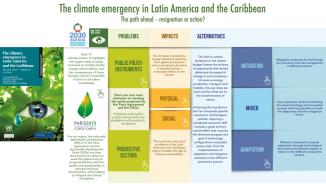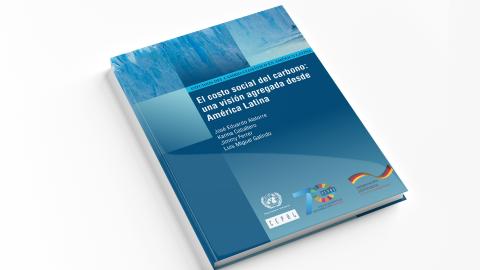infographic
(25 August 2010) International trade is responsible for 21.5% of global CO2 emissions and restrictions are already being put in place to limit production processes that generate them. An international seminar will gather experts at ECLAC headquarters in Santiago on 2-3 September to discuss the consequences of implementing carbon footprint labeling in the transaction of goods and services.
The seminar The Vulnerability of International Trade in Light of the Carbon Footprint, with the participation of experts from Latin America, the United States, Europe, Asia and Oceania, is organized by the Economic Commission for Latin America and the Caribbean (ECLAC) with the support of the Government of France and the European Union.
The carbon footprint is an indicator of the amount of greenhouse gas emissions generated during the production and consumption of goods and services and it has increasingly become a factor of competitiveness of internationally traded products.
Some developed countries have announced unilateral initiatives to distinguish the trade of goods and services according to how much they contaminate, such as the carbon label. This label, to be put into effect in France in January 2011, indicates the amount of carbon dioxide emissions created during a product's manufacturing, transportation or disposal.
The European Union will demand carbon labeling in 2012, with an even greater scope than the French law. European airlines are in the process of reporting their emissions and will be obligated by law to do so in 2012. The United States Congress is still debating the Clean Energy and Security Act 2009, which will also limit the trade of goods and services based on the carbon footprint.
Although for some countries the carbon footprint is a way to draw attention to and restrict unsustainable production and consumption processes, for others, especially for developing nations that export prime materials, the carbon footprint is seen as a potential obstacle to their trade and competitiveness.
In this context, the international seminar will serve to bring together participants from several continents to discuss the use of the carbon footprint in international trade, share the point of view from the region on this issue and explore its possible consequences and opportunities.
The seminar will be inaugurated on Thursday, 2 September at 8:45 a.m. by Alicia Bárcena, Executive Secretary of ECLAC, and Maryse Bossière, Ambassador of France in Chile, followed by a presentation by the Director of ECLAC's Sustainable Development and Human Settlements Division, Joseluis Samaniego.
The media is welcome to attend the seminar (Raúl Prebisch Conference Room, Av. Dag Hammarskjöld 3477, Vitacura, Santiago, Chile).
More information, including the agenda, is available on the ECLAC webpage.
For enquiries, please contact ECLAC's Public Information and Web Services Section. Email: dpisantiago@cepal.org; telephone: (56-2) 210-2040/2149.


